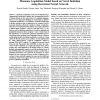Free Online Productivity Tools
i2Speak
i2Symbol
i2OCR
iTex2Img
iWeb2Print
iWeb2Shot
i2Type
iPdf2Split
iPdf2Merge
i2Bopomofo
i2Arabic
i2Style
i2Image
i2PDF
iLatex2Rtf
Sci2ools
IROS
2009
IEEE
2009
IEEE
Phoneme acquisition model based on vowel imitation using Recurrent Neural Network
- A phoneme-acquisition system was developed using a computational model that explains the developmental process of human infants in the early period of acquiring language. There are two important findings in constructing an infant’s acquisition of phonemes: (1) an infant’s vowel like cooing tends to invoke utterances that are imitated by its caregiver, and (2) maternal imitation effectively reinforces infant vocalization. Therefore, we hypothesized that infants can acquire phonemes to imitate their caregivers’ voices by trial and error, i. e., infants use self-vocalization experience to search for imitable and unimitable elements in their caregivers’ voices. On the basis of this hypothesis, we constructed a phoneme acquisition process using interaction involving vowel imitation between a human and an infant model. Our infant model had a vocal tract system, called the Maeda model, and an auditory system implemented by using Mel-Frequency Cepstral Coefficients (MFCCs) through ST...
| Added | 24 May 2010 |
| Updated | 24 May 2010 |
| Type | Conference |
| Year | 2009 |
| Where | IROS |
| Authors | Hisashi Kanda, Tetsuya Ogata, Toru Takahashi, Kazunori Komatani, Hiroshi G. Okuno |
Comments (0)

